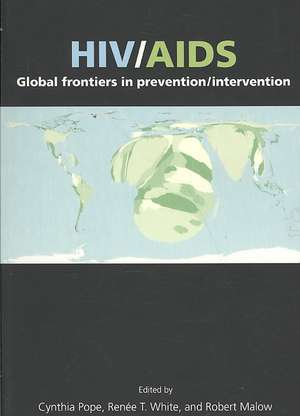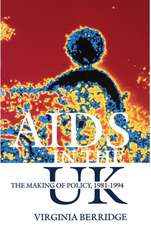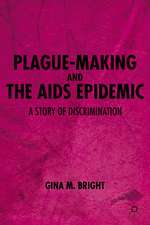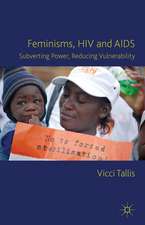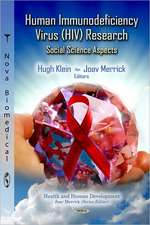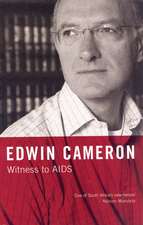HIV/AIDS: Global Frontiers in Prevention/Intervention
Autor Cynthia Pope, Renee T. White, Robert Malowen Limba Engleză Paperback – 23 sep 2008
Key features include:
· Nine original essays from leading scholars in public health, epidemiology, and social and behavioral sciences
· Comprehensive information for individuals with varying degrees of knowledge, particularly regarding methodological and theoretical perspectives
· A look into the future progression of HIV transmission and scholarly research
HIV/AIDS: Global Frontiers in Prevention/Intervention is will serve as a precious resource as a textbook and reference for the university classroom, libraries, and researchers
| Toate formatele și edițiile | Preț | Express |
|---|---|---|
| Paperback (1) | 626.45 lei 6-8 săpt. | |
| Taylor & Francis – 23 sep 2008 | 626.45 lei 6-8 săpt. | |
| Hardback (1) | 1444.13 lei 6-8 săpt. | |
| Taylor & Francis – 24 sep 2008 | 1444.13 lei 6-8 săpt. |
Preț: 626.45 lei
Preț vechi: 659.42 lei
-5% Nou
Puncte Express: 940
Preț estimativ în valută:
119.90€ • 124.70$ • 100.48£
119.90€ • 124.70$ • 100.48£
Carte tipărită la comandă
Livrare economică 14-28 martie
Preluare comenzi: 021 569.72.76
Specificații
ISBN-13: 9780415953832
ISBN-10: 0415953839
Pagini: 622
Ilustrații: 20 tables and Following Suburb Reader
Dimensiuni: 178 x 254 x 30 mm
Greutate: 1.02 kg
Ediția:1
Editura: Taylor & Francis
Colecția Routledge
Locul publicării:Oxford, United Kingdom
ISBN-10: 0415953839
Pagini: 622
Ilustrații: 20 tables and Following Suburb Reader
Dimensiuni: 178 x 254 x 30 mm
Greutate: 1.02 kg
Ediția:1
Editura: Taylor & Francis
Colecția Routledge
Locul publicării:Oxford, United Kingdom
Cuprins
Foreword: Peter Aggleton and Richard Parker, "Globalization, Vulnerability, and the response to HIV and AIDS." Introduction 1. Cynthia Pope, Renée T. White, and Robert Malow, "Global Convergences: Emerging Issues in HIV Risk, Prevention, and Treatment" Section 1: Evolving Theories of Harm Reduction and HIV risk 2. Framing Essay: Scott Burris, "Addressing the "Risk Environment" for Injection Drug Users: The Mysterious Case of the Missing Cop." 3. Megan Comfort, "HIV/AIDS and the United States’s Correctional Institutions: A Looming Public-Health Disaster." 4. Michael Duke, JiangHong Li, and Merrill Singer. "Drug use, Syringe Sharing and HIV Risk in the People’s Republic of China" 5. Scott Clair, Merrill Singer, Francisco I. Bastos, Monica Malta, Claudia Santelices, and N. Ebertoni. "The Role of Drug Users in the Brazilian HIV/AIDS Epidemic: Patterns, Perceptions and Prevention." Section 2: Gender, Sexuality and HIV Risk 6. Framing Essay: Geeta Rao Gupta and Ellen Weiss, "Gender and HIV: Reflecting Back, Moving Forward" 7. Rhonda Rosenberg and Robert Malow, "The Hard Science of Hard Risks in Women’s HIV Prevention: Making Biology Part of the Context." 8. Treena Orchard, John O’Neil, James Blanchard, and Stephen Moses, "HIV/AIDS Prevention programming with ‘traditional’ sex workers in rural India: challenges for the empowerment approach in community-sanctioned sex work communities." 9. Olena Hankivsky, "The Challenge of HIV/AIDS in Ukraine" 10. Laëtitia Atlani-Duault, "Homosexual Repression and AIDS in Post-soviet Central Asia" 11. Hansjörg Dilger, "African Sexualities Revisited: Gender, Social Relations and Culture in the Context of Globalization and AIDS in Tanzania." 12. Taigy Thomas, Lianne Urada, Donald Morisky, and Robert Malow, "Best Practice Example of the Philippines: A Low-Level Prevalence Country and the Male "Bridge" Population" Section 3: Critical Intersections between Biomedicine, Behavior, and HIV 13. Framing Essay: Sande Gracia Jones, "Looking Inside the Pill Bottle: The Evolution of HIV Antiretroviral Combination Drug Therapy." 14. Laurie Sylla and Clair Kaplan, "Microbicides: Revolutionizing HIV Prevention?" 15. Durvasula, Ramani, Lisa R. Norman, and Robert Malow. "Current Perspectives on the Neuropsychology of HIV" 16. Jane Simoni, K. Rivet Amico, Cynthia Pearson, and Robert Malow, "Overview of Adherence to Antiretroviral Therapies" 17. Jannette Berkley-Patton, "Adherence Masters: Reaching for Perfection in ART Adherence" Section 4: Explorations in New Forms of Intervention and Prevention 18. Framing Essay: Ralph J. DiClemente, Colleen P. Crittenden, Eve S. Rose, and Jessica M. Sales, "Optimizing Prevention and Control of STI/HIV among Adolescents: A Social Contextual Perspective" 19. H. Virginia McCoy, Robert Malow, Ruth W. Edwards, Anne Thurland, Rhonda Rosenberg, "Evidence-Based Community Interventions: The Community Readiness Model" 20. Jessy G. Dévieux, Marie-Marcelle Deschamps, Deanne M. Samuels, Michèle M. Jean-Gilles, Gilbert Saint Jean, Lisa Metsch, and Robert Malow, "Barriers to Care among HIV-positive Haitians: An examination of sociocultural factor." 21. Peter Ibembe, "The Evolution of the ABC Strategy of HIV Prevention in Uganda: state and international impact on public health" 22. Kathy Goggin, Megan Pinkston, Nceba Gqaleni, Thandi Puoane, Douglas Wilson, Jannette Berkley-Patton, and David A. Martinez, "The Role of South African Traditional Health Practitioners in HIV/AIDS Prevention and Treatment." Section 5: Policies of (In)Justice: Structural Responses to HIV 23. Framing Essay: Renee White, Cynthia Pope, and Robert Malow, "HIV, Public Health, and Social Justice: Reflections on the Ethics and Politics of Health Care" 24. Susan Craddock, "AIDS and the Politics of Violence." 25. Tim Frasca, "Lessons from the Latin American AIDS Epidemic" 26. Ronald Bayer and Gerald Oppenheimer. "Roll-out and Rationing: Providing Anti-retroviral Therapy in South Africa" 27. Tasleem Padamsee, "Understanding the Making of National HIV/AIDS Policies: The Critical Role of Health Care Institutions in the U.S. and the U.K." 28. Antonio Estrada and Barbara Estrada, "Barriers to HIV/AIDS Medical Care among HIV Infected Latinos Residing along the U.S.-Mexico Border" Section 6: Media and HIV/AIDS 29. Framing Essay: Seth Noar, "The Utility of 'Old' and 'New' Media as Tools for HIV Prevention" 30. Kylie Thomas, "HIV/AIDS: Towards a Living History in Post-Apartheid South Africa" 31. Kriss Barker, "Sex, Soap, and Social Change: The Sabido Methodology." 32. Siv Cheng, "A Cambodian Story of a Global Epidemic." Section 7: Vulnerable Populations: Conflict, Natural Disaster, and Migration 33. Framing Essay: Paul B. Spiegel and Anne Bennedsen, "The Epidemiology of HIV among Conflict-Affected and Displaced Populations: Current Concepts" 34. Karla Wagner, Deborah Brief, Melanie J. Vielhauer, Steve Sussman, Terence M. Keane, and Robert Malow, "The Potential for PTSD, Substance Use and HIV Risk Behavior among Adolescents Exposed to Hurricane Katrina" 35. Ezekiel Kalipeni, Joseph Oppong, and Jayati Ghosh, "Africa’s Globalization: The Colonial Labor Economy, Migration and HIV/AIDS" 36. Roger McLean, "Mobile Populations, Vulnerability and HIV/AIDS in a Globalized world – the case of the English speaking Caribbean" 37. Heather Culbert, David Tu, Daniel P. O’Brien, Tom Ellman, Clair Mills, Nathan Ford, Tina Amisi, Keith Chan, Sarah Venis, Medecins San Frontieres, "HIV Treatment in a Conflict Setting: Outcomes and Experiences from Bukavu, Democratic Republic of the Congo." 38. Michael J. Westerhaus, Amy C. Finnegan, Yoti Zabulon, and Joia S. Mukherjee. "Framing HIV Prevention Discourse to Encompass the Complexities of War in Northern Uganda." Section 8: Living and Caring for Individuals with HIV/AIDS 39. Framing Essay: Todd Faubion, "Multiplicity of Meaning: Living with HIV/AIDS" 40. Mary Fisher, "A Word to Policymakers and Pilgrims." 41. Helen Ruth Aspaas. "Mending the Safety Net: Women Community Activists in AIDS-Affected Regions of East Africa." 42. Jonathan Mayer, "Back to Nima" 43. Ami Moore, "Resilience and meaning ascribed to the experiences of care giving to children living with HIV/AIDS in Togo" Section 9: Globalizing theory on HIV/AIDS: Frameworks for the future 44. Framing Essay: Sam Friedman, "Globalization and Interacting Large-scale Processes and How They May Affect the HIV/AIDS Epidemic" 45. Jason Meyers and Robin Kearns, "Feelings, Bodies, Places: New directions for geographies of HIV/AIDS" 46. Cindy Patton, "‘Scaling Up:’ Managing the Global and the Local in the HIV Pandemic" 47. Sandra Sufian, "Towards an Interdisciplinary Agenda for Research on HIV/AIDS in the Middle East and North Africa: New Directions for the Age of Globalization" 48. Vinh-Kim Nguyen. "Viropolitics: How HIV is Producing Globalization"
Notă biografică
Cynthia Pope is Associate Professor of Geography at Central Connecticut State University and Lecturer in Global Health at Yale University. Her work deals with the intersections of geopolitics, gender, and HIV risk in the developing world, particularly Latin America and the Caribbean.
Renee T. White is Professor of Sociology and co-director of Black Studies at Fairfield University. She is co-editor of the Journal of HIV/AIDS Prevention in Children and Youth. Her research focuses on health disparities, reproductive and AIDS-related social policy, urban inequalities and social justice.
Robert Malow is a Professor of Public Health at Florida International University and is associated editor of AIDS Education and Prevention. He has authored over 150 scientific publications and has led over a dozen National Institutes of Health-funded projects in the area of HIV and substance abuse.
Renee T. White is Professor of Sociology and co-director of Black Studies at Fairfield University. She is co-editor of the Journal of HIV/AIDS Prevention in Children and Youth. Her research focuses on health disparities, reproductive and AIDS-related social policy, urban inequalities and social justice.
Robert Malow is a Professor of Public Health at Florida International University and is associated editor of AIDS Education and Prevention. He has authored over 150 scientific publications and has led over a dozen National Institutes of Health-funded projects in the area of HIV and substance abuse.
Recenzii
"Cynthia Pope, Renee T. White, and Robert Malow, in collaboration with an interprofessional team of 108 colleagues, offer a compendium of essays and articles that advance our understanding of the complex challenges that HIV/AIDS poses for public health practitioners and public health infrastructure globally. The book includes contributions from professionals, advocates and HIV activists who have made HIV and AIDS their life's work. Contributors include internationally respected experts in their respective fields as well as emerging voices that will carry the dialogue of HIV and its influence on human populations and environments into the future. This book covers emerging issues in HIV risk, prevention, and treatment. It includes sections on (a) evolving theories of harm reduction and HIV risk, (b) gender, sexuality, and HIV risk, (c) critical intersections between biomedicine, behaviour, and HIV, (d) exploration of new forms of intervention and prevention, (e) social structural policy responses to HIV, (f) the role of the media in HIV/AIDS, (g) HIV vulnerabilities and vulnerable populations, (h) living and caring for persons with HIV/AIDS, and a concluding section dedicated to (i) globalizing theory on HIV/AIDS for the future. Each section opens with a framing essay to provide students of public health, related professions, and the lay reader with context for the discussion that unfolds. The editors have skillfully selected exemplars from the broad geographies and perspectives that influence persons affected by HIV disease. Not only does the book discuss the geographical and geopolitical environments around the globe that provide the contexts in which HIV exists and sometimes flourishes, but it also covers the internal geographies of persons living with HIV disease. This internal or human geography highlights the complexities of the interrelationships between host and disease vector and how these factors become more complex when viewed from the spatial and temporal elements of the broader global environments."
-- Craig Phillips, University of British Columbia, Nurse Education Today, January 2009
"In this original edition of HIV/AIDS: Global Frontiers in Prevention/Intervention, Cynthia Pope, Renee T. White, and Robert Malow provide an impressive examination of HIV/AIDS from a historical, social, political, and biomedical perspective while transcending issues of culture, gender, and global impact. By making minimal assumptions about the reader’s knowledge and with an outstanding range of insightful articles, the editors make accessible a comprehensive and highly readable introduction to HIV and AIDS on a global scale…The editors begin with an overview that addresses global convergences and emerging issues in HIV risk, prevention, and treatment. This overview, with its discussion of the importance of using an interdisciplinary and structural approach to the conceptualization of the complex dynamics that encourage or mitigate HIV prevention, transmission, and treatment worldwide, provides the foundation for the remainder of the book. As the title clearly implies, Pope, White, and Malow methodically explore the omnipresent concept of HIV/AIDS from a global viewpoint in terms of evolving theories of harm and risk reduction, gender and sexuality, the interrelationship of biomedicine and behavior, exploration of new forms of intervention and prevention, policies of justice, media and HIV, vulnerable populations, caring for individuals with HIV/ AIDS, and globalizing theory on HIV/AIDS. To achieve this noteworthy and comprehensive goal, the book is divided into nine sections and has a total of 37 chapters. Each section begins with a framing essay that sets the stage for the chapters within the section…The editors conclude this comprehensive overview of the global HIV/AIDS epidemic with a section addressing the concept of a globalizing theory on HIV/ AIDS and frameworks for future prevention and intervention. The last of the nine framing essays focuses on the global impact of the HIV/AIDS epidemic in terms of other large-scale social and economic processes, many of which have been addressed throughout this voluminous text... In this textbook and reference, Pope, White, and Malow have meticulously assembled a resource that offers myriad cutting-edge issues in HIV/AIDS research, policy making, and advocacy from a global perspective… Without question, this book provides a wealth of information and presents a unitary geographical, sociological, and public health frame of reference for the analysis of HIV/AIDS prevention and intervention on a global scale."
-- Eric Fenkl, Visiting Clinical Assistant Professor, Florida International University, Miami, JOURNAL OF THE ASSOCIATION OF NURSES IN AIDS CARE, Vol. 20, No. 3, May/June 2009
"I would use this book for a general introductory HIV/AIDS course, a more specific HIV/AIDS preventioncourse, or I would use individual sections and chapters for an introductory development or public health course. The section essays will remain temporally relevant even as new developments (such as a possible vaccine and changes in the ebb and flow of international funding) rapidly evolve. Overall, this book offers a solid and provocative foundation for complex problems that biomedical research, social science, and active organizations address. The editors’ determination to encourage interdisciplinary conversations that are practical and timely is evident in each section and each chapter."–Stephanie Brooker, University of Colorado (2010)
-- Craig Phillips, University of British Columbia, Nurse Education Today, January 2009
"In this original edition of HIV/AIDS: Global Frontiers in Prevention/Intervention, Cynthia Pope, Renee T. White, and Robert Malow provide an impressive examination of HIV/AIDS from a historical, social, political, and biomedical perspective while transcending issues of culture, gender, and global impact. By making minimal assumptions about the reader’s knowledge and with an outstanding range of insightful articles, the editors make accessible a comprehensive and highly readable introduction to HIV and AIDS on a global scale…The editors begin with an overview that addresses global convergences and emerging issues in HIV risk, prevention, and treatment. This overview, with its discussion of the importance of using an interdisciplinary and structural approach to the conceptualization of the complex dynamics that encourage or mitigate HIV prevention, transmission, and treatment worldwide, provides the foundation for the remainder of the book. As the title clearly implies, Pope, White, and Malow methodically explore the omnipresent concept of HIV/AIDS from a global viewpoint in terms of evolving theories of harm and risk reduction, gender and sexuality, the interrelationship of biomedicine and behavior, exploration of new forms of intervention and prevention, policies of justice, media and HIV, vulnerable populations, caring for individuals with HIV/ AIDS, and globalizing theory on HIV/AIDS. To achieve this noteworthy and comprehensive goal, the book is divided into nine sections and has a total of 37 chapters. Each section begins with a framing essay that sets the stage for the chapters within the section…The editors conclude this comprehensive overview of the global HIV/AIDS epidemic with a section addressing the concept of a globalizing theory on HIV/ AIDS and frameworks for future prevention and intervention. The last of the nine framing essays focuses on the global impact of the HIV/AIDS epidemic in terms of other large-scale social and economic processes, many of which have been addressed throughout this voluminous text... In this textbook and reference, Pope, White, and Malow have meticulously assembled a resource that offers myriad cutting-edge issues in HIV/AIDS research, policy making, and advocacy from a global perspective… Without question, this book provides a wealth of information and presents a unitary geographical, sociological, and public health frame of reference for the analysis of HIV/AIDS prevention and intervention on a global scale."
-- Eric Fenkl, Visiting Clinical Assistant Professor, Florida International University, Miami, JOURNAL OF THE ASSOCIATION OF NURSES IN AIDS CARE, Vol. 20, No. 3, May/June 2009
"I would use this book for a general introductory HIV/AIDS course, a more specific HIV/AIDS preventioncourse, or I would use individual sections and chapters for an introductory development or public health course. The section essays will remain temporally relevant even as new developments (such as a possible vaccine and changes in the ebb and flow of international funding) rapidly evolve. Overall, this book offers a solid and provocative foundation for complex problems that biomedical research, social science, and active organizations address. The editors’ determination to encourage interdisciplinary conversations that are practical and timely is evident in each section and each chapter."–Stephanie Brooker, University of Colorado (2010)
Descriere
This Reader seeks to address the need for a comprehensive resource for the social, political, gendered and biomedical implications of HIV/AIDS.
